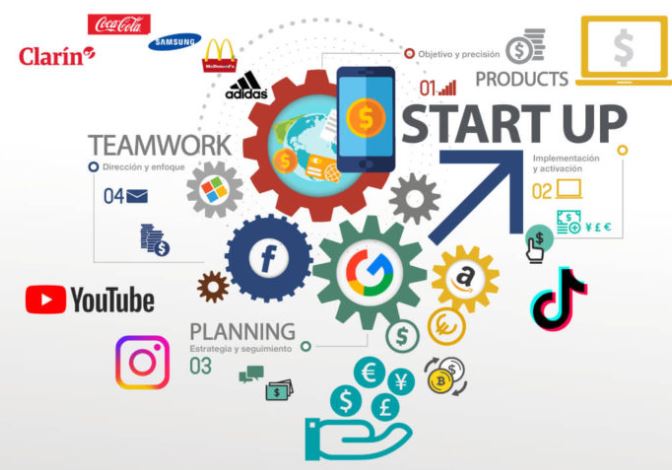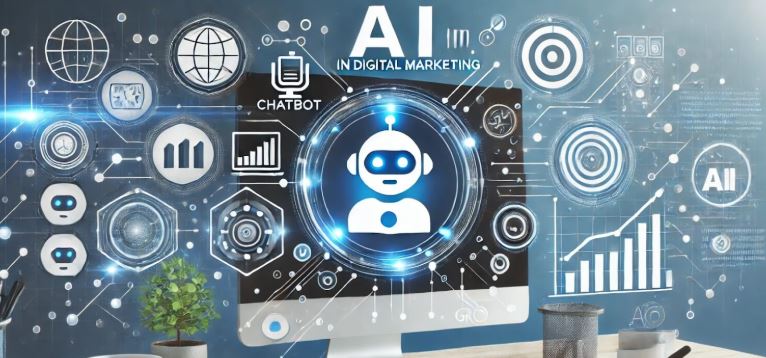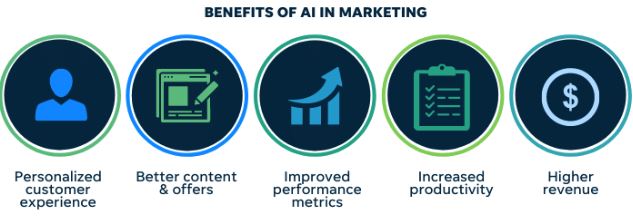Introduction to AI Marketing
Overview of AI Marketing
AI marketing is data collection and analysis of data that impacts marketing to make automated decisions using artificial intelligence. In addition, where there is need of digital marketing efforts. In today’s marketing strategy, marketing is most important for its ability to handle large volume data and make decisions based on customer interaction. It has a competitive advantage in optimizing the performance.
Importance of AI in modern marketing
It helps in making personalization experiences by placing the customer preferences which is known as personalization which engage customers with their interest. Moreover, it helps in automation with more content creation and engagement in social media. Also, predict future trends based on past customer behaviors and predictive analytics is useful for targeted marketing. It also assists in data-driven decision-making for understanding real-time analytics and targeted campaigns. There is a widespread usage of AI tools for customer services through chatbots predicting and responding to customer’s queries. In providing insights to customers. Moreover, it is helpful in the content creation where it gives more content related to inputs. The competitive Edge AI is useful for analyzing business conditions in the market and managing large volumes of customer data.
Marketing

Understanding of AI Marketing
Key technologies and applications in AI Marketing
Artificial intelligence to enhance marketing and AI tools are useful for making decisions and improving strategies (Haleem, Javaid, Qadri, Singh, & Suman, 2022). To predict the customer behaviors and personalize the content machine learning algorithms help provide the recommendations. Natural language processing is for sentimental analysis content creation and chatbots. It also analyzes the conversations that are happening on social media automate the reactions based on the behaviors and give reviews. Thus, to engage with the audience by making them visible to the relevant content which is smart content curation helps to learn and show the recommendations based on the system.
Another AI technology is voice search which is developed by Google and Amazon it will help to bring traffic. Predictive analytics is used for predicting purchases based on the repeat purchases of customers. Moreover, it analyzes and makes accurate predictions. There are algorithms from machine learning that provide effective content and achieve content based on the methods (Allen, 2017). Another AI application is dynamic pricing where sales make use of discounts and offers to attract customers it targets special customers to attract traffic and maximize profit.
Historical Evolution of AI Marketing
Earlier, the various techniques that are applied by the researchers are known as decision trees, game theory, and linear programming where the use of AI for marketing was made as a first attempt in the year 1950s and 1960s. To make the strategies regarding pricing and marketing these were used. To analyze customer behavior and preferences, there is a need for neural networks and expert systems in the I970s and 1980s (Jasminara, 2023).
Additionally, new opportunities made up using the data collection methods with the increase of Internet usage and e-commerce usage in the 1990s to 2000s. There was usage of AI tools by the marketers in search things such as of e-mail marketing, search engine optimization, and engaging the customers through digital platforms. Earlier, there was the usage of natural language processing, cloud computing, and big data in the 2010s and 2020s the marketers generated the content using AI and designed specific campaigns to predict the outcomes.
AI Marketing

Key AI Technologies in Marketing
Machine Learning
Basically, with the help of machine learning historical analysis is done. It forecasts the behaviors of customers and ML algorithms helps marketers in optimizing the placements of products. Creating the targeted promotions and reaching the sales and targets. The transaction history provides all demographic data related to customer actions and marketing communications to increase customer retention. There are also individualized experiences where a specific group of people are interested in their responsive interest so, the machine learning algorithm understands all the patterns of individualization and content is generated based on demographics and predicts the actions in the future.
Natural Language Processing
Make the computers understand the human language NLP guides systems. With the help of written language and spoken the processing of computers. For any business that makes use of NLP. The usage of chatbot communication helps engage the customers and provide relevant content. It enhances the order process and real-time chat. It tracks the metrics and uses data analytics. The chatbots make classifications on the input of what the user wants and scan the entities such as people, businesses, places, and various categories. Text analysis and sentiment detection extract meaningful conversations and insights. It matches the customer’s emotions and provides tailoring strategies for marketing. NLP also generates personalized content by saving time and making sure of consistency in messaging. The virtual assistants handles the queries in real time.
Computer Vision
For marketing strategies, there are various images and video recognitions and patterns to understand the content. Artificial intelligence helps in analyzing the emotions and faces of individuals and their interest in the marketing of products understood through computer vision. Based on the images provided and uploaded it shows the products related to the outfit or gadgets in a similar style and recommend those products to the customers. The retailers also make use of these patterns of recognition of images and facial expressions to gain understanding so that it enhances the experiences of emotional response towards products and engage the marketing.
Data Analysis and Big Data
For targeting and campaign optimizations modern marketing is in the picture. Big data and data analysis work on large platforms in segment analysis of customers and behavioral analysis. The artificial intelligence analyzes trends and segmentation will be based on certain groups of people for seasonal marketing. The specific segments are understood by allowing adjustments and spending past purchases and interactions. It generates revenues based on past purchases of customers and provide a high retention rate.
Voice assistants and AI-driven recommendations
Through voice recognition, the Voice Assistants helps with personalized choices. Based on the preference and promotions it recommends the products and make sure of voice-enabled shopping. It makes voice commands and allow customers to make purchases. In the websites of Amazon, suggest products based on clicks and purchases. To sell the products online calls and make the customers engaged. Based on the customer interaction and response to the customer. The voice assistant makes the verification of the calls and share the details.
Benefits of AI in Marketing
Personalization at scale
Personalization not only involves in simply conveying advancements with data analytics and artificial intelligence. Moreover, it involves creating the content based on individual experience. By making an analysis and making common attributes together and sending the messages to the targeted people. Later, the next step is hyper-personalization where only individual customers analyzes for customer experience. One of the examples is Amazon used hyper-personalization to give product recommendations based on search results and make use of marketing emails for each customer (Nagendra, 2024). It has ensured the tailored content and engaged the customers with personalized choices.
Use of automation
Since there are many repetitive tasks, AI marketing automation helps in reducing manual efforts. Creating content by humans takes a lot of time automation reduces the time. As there is vast information on the Internet it helps in driving decision making and deeper understanding of opportunities of audience. AI-driven automation also uses machine learning algorithms for analyzing the metrics and creating campaigns such as ad creations, parameters of targeted advertisements, and maximizing the efforts in delivery (Nalini, Radhakrishnan, Yogi, Santhiya, & Harivardhini, 2021). Automated campaigns also empower targeted marketing by developing new efficient techniques with innovation and making stronger connections with the customers.
Improved decision making
Enhance the data-driven decisions AI uses marketing efforts to identify the patterns and behaviors of customers. In the traditional analysis there was no proper identification of trends but now making use of learning algorithms and predictive analytics has changed the era of marketing in real-time management and providing effective results in marketing. Moreover, it is able to assume the content in social media and gain insights from the data and the decisions based on the understanding. This is useful for real-time management and adjustments in the performance.
Cost reduction and return on investment
As there are tasks such as providing customer services and content creation by the chatbots. The intervention of manual efforts needs a high cost to provide detailed links and training for humans. But with the help of AI marketing, it is easy to create content within the budget and get the highest returns when compared to human effort. Moreover, helps to analyze personalized messages and spend time on advertisements at the right time to reach the audiences. Also, this improves the profitability and increase the return on investment.
Benefits of AI Marketing

Challenges and Ethical Considerations
Data privacy and security
Particularly, to handle the vast amount of data there is a lot of data required for personalization and targeted advertisements. Important information about individuals is also needed which helps in analyzing the patterns so these are prone to cyber-attacks. Therefore, safety and security measures need to be taken care of by maintaining customer trust and reputation (Rijmenam, 2023). There is also the General Data Protection Regulation which ensures that personal data and information is safe with all the security measures. Another important aspect is maintaining transparency in handling the data and ethical considerations for respecting the privacy of customers.
Bias and Discrimination
AI-driven marketing another ethical issue is discrimination and buyers. With the large data sets some follow stereotypes and inequalities. There are also ethical and legal concerns regarding fairness. The algorithms also provide disadvantages for job seekers in providing and limiting job opportunities. In businesses making the decisions, it is also bias towards the customer trust. Some of the algorithms are based on politically biased content and viewpoints and they only support certain stereotypes in generating the content.
Dependence on AI Technology
The usage of artificial intelligence for managing targeted advertisements. Sometimes it may fail to understand the emotional state of the customers. In this case, there are a few segments and consumer behaviors that AI cannot analyze in real-time. Over-dependence is difficult in creating content and innovative strategies might also get reduced which is by the human in an emotional level. So, there should be the maintenance of a balance between AI and the application of humans in managing the efforts. Moreover, there should be human creativity in creating successful marketing strategies and aligning the goals of customers.
Concerns in job displacement
One more ethical challenge is job displacement. However, automation helps for analysis and content creation there is the replacement of humans with the AI. The AI chatbots provide support to the inquiries from the customers this enhance the operational efficiency but at the starting stage, it misses the human interaction that might not seem lively. In marketing there will be social media management which faces challenges by using AI tools in managing the ads analyzing the capabilities, and trends it might find difficult for automation and there are issues in job displacement. And the workers are at risk in producing because there are a lot of AI technologies that are making creative work and decision-making.
The Future of AI in Marketing
With the usage of smart products like wearables and appliances in homes, smart technologies enhance predictions in the future and deliver recommendations for products. IoT devices provide instant notifications based on tracking. Moreover, this helps to analyze what needs in the future. There is plan of smart predictions. In addition, with the help of Augmented Reality, it enhances performance by providing dynamic content (Empreender, 2021). There are demonstrations provided virtually and engage the customers. The virtual experience provides customer trust in real life.
With the usage of virtual reality, it makes more enhanced content and make customers respond to the usage. There are huge campaigns made and virtual testing be done in any form of industry such as fashion, beauty, automobile, and other industries making the audience connected. By collaborating AR, VR, and IoT the marketing system in digital platforms increases and special offers are provided showing the product demos and follow-ups are enhanced by using the smart technologies.
The usage of natural language processing in sentiment analysis or consumer sentiment. The artificial intelligence analyzes the content based on the products and brands. Moreover, AI shifts consumer sentiment to emotional analysis and suggests changes to the strategies of marketing. Furthermore, by giving high-quality content making the brands become more aware and generate product descriptions, which saves more time in the future. There is handling of complexity in the sales processes and engagement without direct human involvement. It takes up the responsibility from start to finish without any disturbances. It makes adjustments in real-time by creating a more efficient process. AI-driven personalization will also be used based on the interest of the customer using the right time and scheduling in social media.
Conclusion
With the help of advanced technologies such as natural language processing, machine learning, and various technologies improve AI marketing. Moreover, it provides personalization, decisions, and analyze large amounts of data and predict future trends. As there are also challenges regarding privacy and ethical considerations all the challenges need to be overcome by applying the techniques in the future. Finally, it has shaped the industry marketing with advanced applications like hyper-personalized experience, decision-making in real-time, and usage of multiple platforms with integration of AI and increasing the marketing flow by working with innovative techniques. Furthermore, AI technology also makes enhancements and provide future growth with advanced technologies of automation and enhance offerings for better customer experience.
References
Allen, R. (2017, Jun 29). 15 Applications of Artificial Intelligence in Marketing. Retrieved from Linkedin: https://www.linkedin.com/pulse/15-applications-artificial-intelligence-marketing-robert-allen
Empreender. (2021). Artificial Intelligence In Digital marketing. United Kingdom: Bibliomundi.
Haleem, A., Javaid, M., Qadri, M. A., Singh, R. P., & Suman, R. (2022). Artificial intelligence (AI) applications for marketing: A literature-based study. International Journal of Intelligent Networks, 3, 119-132. Retrieved from https://www.sciencedirect.com/science/article/pii/S2666603022000136
Jasminara. (2023, May 08). Historical evolution of AI in marketing. Retrieved from Linkedin: https://www.linkedin.com/pulse/historical-evolution-ai-marketing-syed-jasminara
Nagendra, K. (2024, Apr 16). Personalization at Scale: AI’s Role in Tailored Marketing. Retrieved from Linkedin: https://www.linkedin.com/pulse/personalization-scale-ais-role-tailored-marketing-nagendra-qeu4c
Nalini, K., Radhakrishnan, P., Yogi, G., Santhiya, S., & Harivardhini, V. (2021). Impact of Artificial Intelligence (AI) on Marketing. International Journal of Aquatic Science, 12(02), 3159-3167. Retrieved from https://www.journal-aquaticscience.com/article_135000_f3c3f0c174c2cf337617c21cb7a7a2cc.pdf
Rijmenam, M. V. (2023, Feb 17). Privacy in the Age of AI: Risks, Challenges and Solutions. Retrieved from Thedigitalspeaker: https://www.thedigitalspeaker.com/privacy-age-ai-risks-challenges-solutions/
Keywords
Content creation, AI Marketing, Biased AI, Chatbots, Big data.
Relevant Articles
Generative AI and its impact on marketing
Read More about the Topic
Artificial intelligence in marketing: exploring current and future trends
The Future of Marketing: The Transformative Power of Artificial Intelligence
